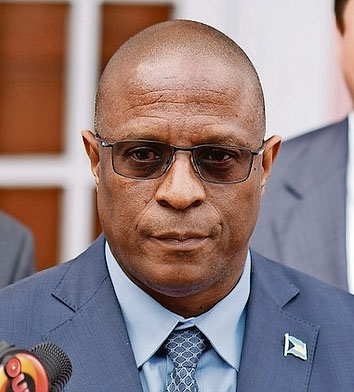By P. J. Ferguson

The past few weeks have marked a historic turning point for Prime Minister Philip Davis—a leader who has steered his administration from the fog of midterm discontent toward a bold and focused execution of national priorities. It’s a masterclass in leadership, and it throws into sharp relief the sheer inadequacy of the man who dares call himself Leader of the Opposition.
Let’s begin at the beginning.
In September 2021, the Bahamian people ousted the Minnis administration and handed the reins to Prime Minister Davis under the banner of a “New Day.” At the time, the nation was staggering—COVID-19 had ravaged lives and livelihoods and Hurricane Dorian had flattened entire communities. Yet under Davis’s leadership, not only did the economy stabilize—it surged. Record growth. Expanded investment. Recovery not just promised, but delivered.
And what does Michael Pintard, the self-styled statesman, have to offer in response? Revisionist history and political theatrics.
We must remember that Pintard wasn’t a sideline observer during the disastrous Minnis years—he was a Cabinet minister, an active architect of policy. Every misstep, every cold, calculated decision made by that administration bore his finge rprints. He was in the room. He raised his hand. And now he seeks to distance himself from the very legacy he helped create.
Take, for example, the Value Added Tax debacle. Perry Christie will forever be remembered for introducing VAT—a necessary evil, chosen from a menu of bad options. But Minnis and Pintard? They didn’t just keep VAT—they gouged the nation with it. On July 1, 2018, with the stroke of a pen, they hiked VAT from 7.5% to 12%—a staggering 60% increase that sent the cost of living into orbit overnight. To be clear, Pintard was one of 31 FNM Members of Parliament that voted to increase VAT taxes. No consultation, no compassion, no plan—just blind, punitive austerity masked as fiscal policy.
The excuse? Increasing revenue. The result? Recession, blacklists, and a public trust shattered. And when Hurricane Dorian devastated Abaco and Grand Bahama the following year, did the Minnis-Pintard government offer tax relief? No. They stood firm, cold and immovable, as storm-battered Bahamians cried out for help.
What makes it all the more offensive is that Pintard is a Grand Bahama native. One might expect some urgency—some personal investment—in the island’s recovery. But no. Grand Bahama languished, neglected and abandoned, right through to the 2021 campaign. Leadership isn’t just about speeches and soundbites—it’s about action, especially when it’s hard. Pintard was nowhere to be found. It was Mr. Pintard that blindly supported the Grand Bahama Port Authority and always seems to come down on the side of taxing the Bahamian people, when it matters. I am thinking specifically about the power bill increases that he said should go through, against his own Grand Bahama constituents. It would appear that he is always beholden to whomever pays the bills.
And yet, he struts across the national stage, chasing headlines and cameras with the eagerness of a man who thinks branding is the same as leadership. His pattern is predictable: wait until the public consensus is clear, then rush to the front like he led the charge. In Bahamian parlance, we call it flammin’—talking loud and saying nothing of substance.
It’s no surprise that the Free National Movement’s paid echo chamber, masquerading as journalism at a local daily, bends over backward to paint Pintard as a serious thinker. But let’s examine the facts. The most consequential economic event for Grand Bahama in a generation—the sale of the Grand Lucayan—came and went without him. No leadership. No vision. No presence.
Michael Pintard wants to be seen as a future Prime Minister.
But based on his record, the Bahamian people should ask: Prime Minister of what, exactly?







